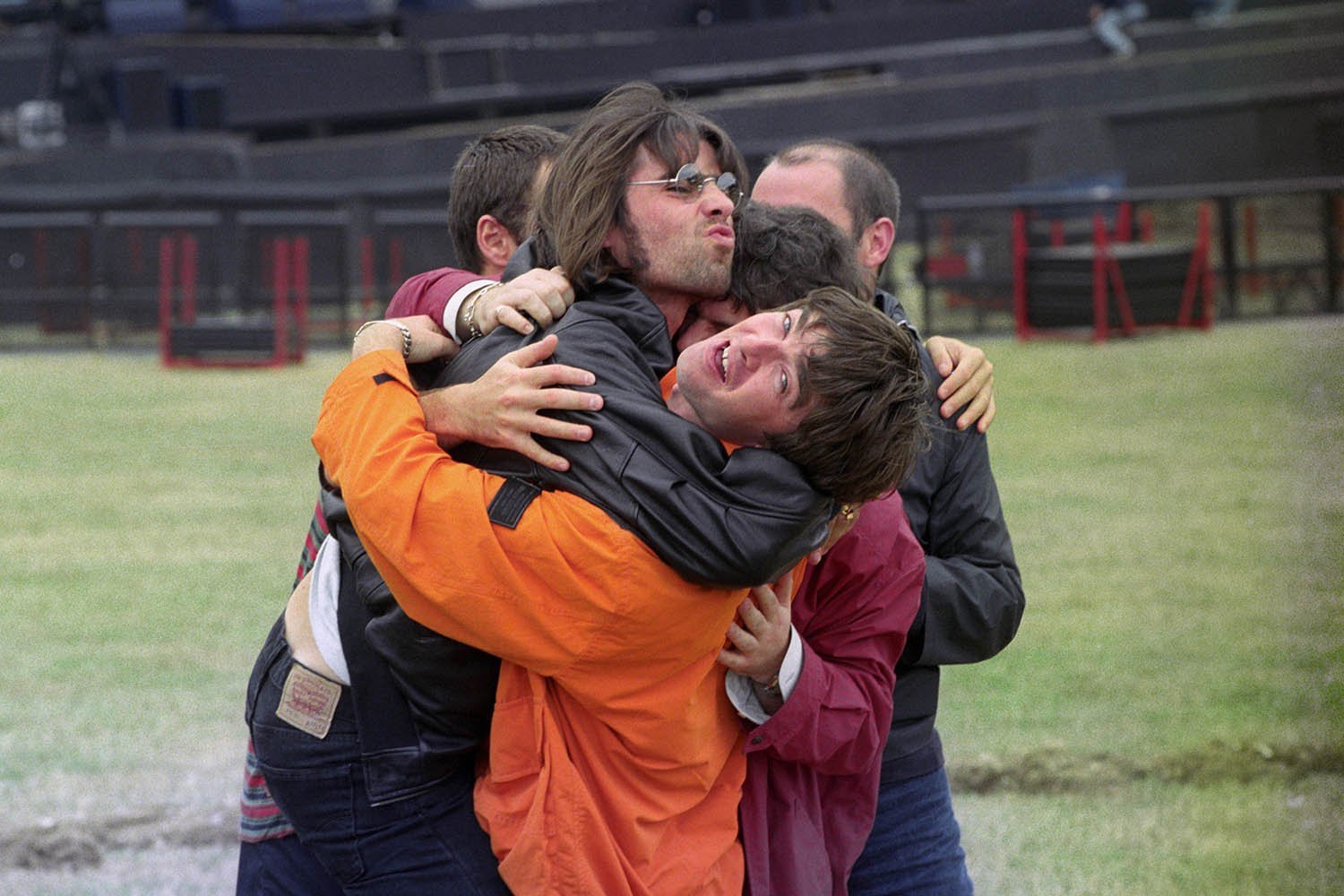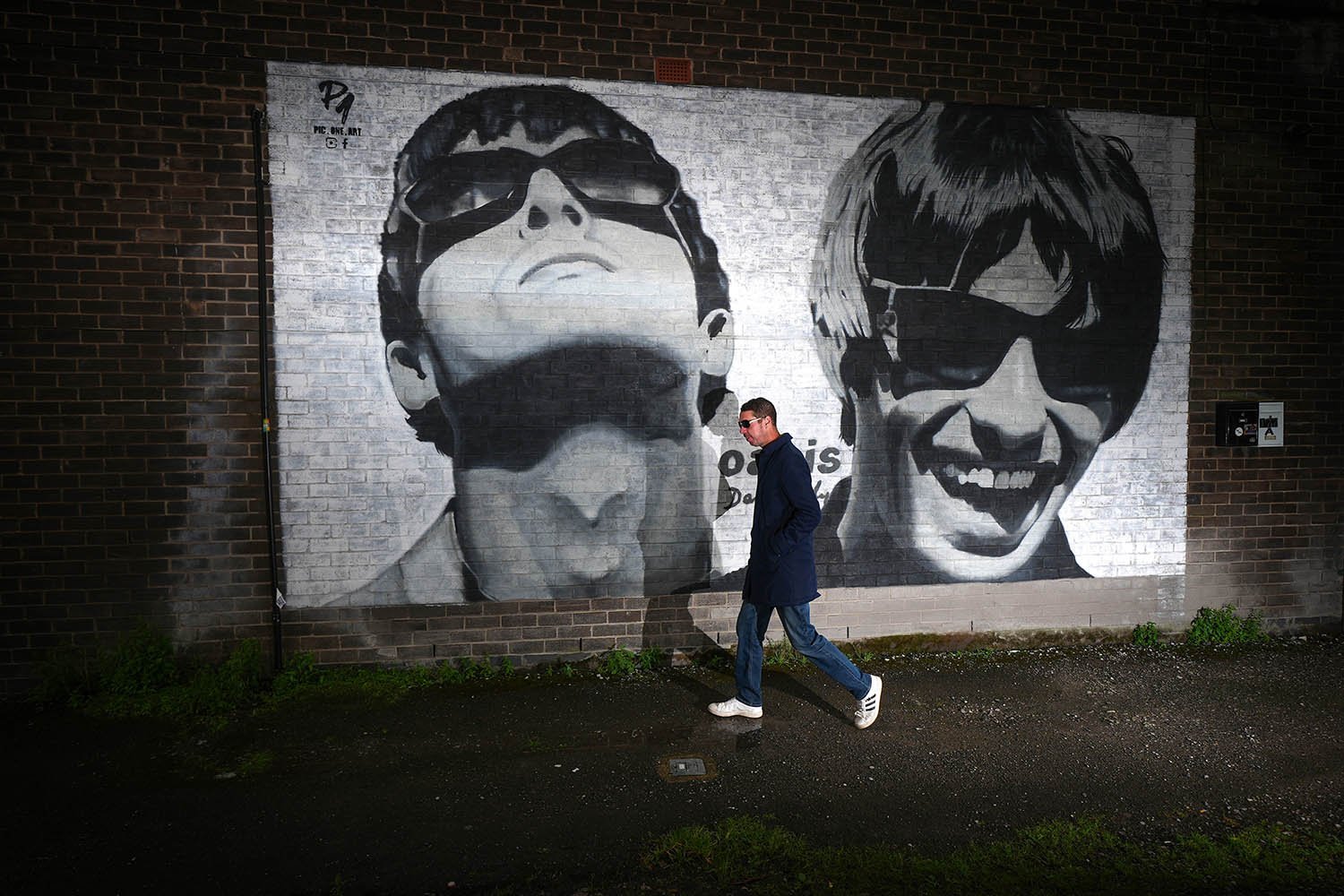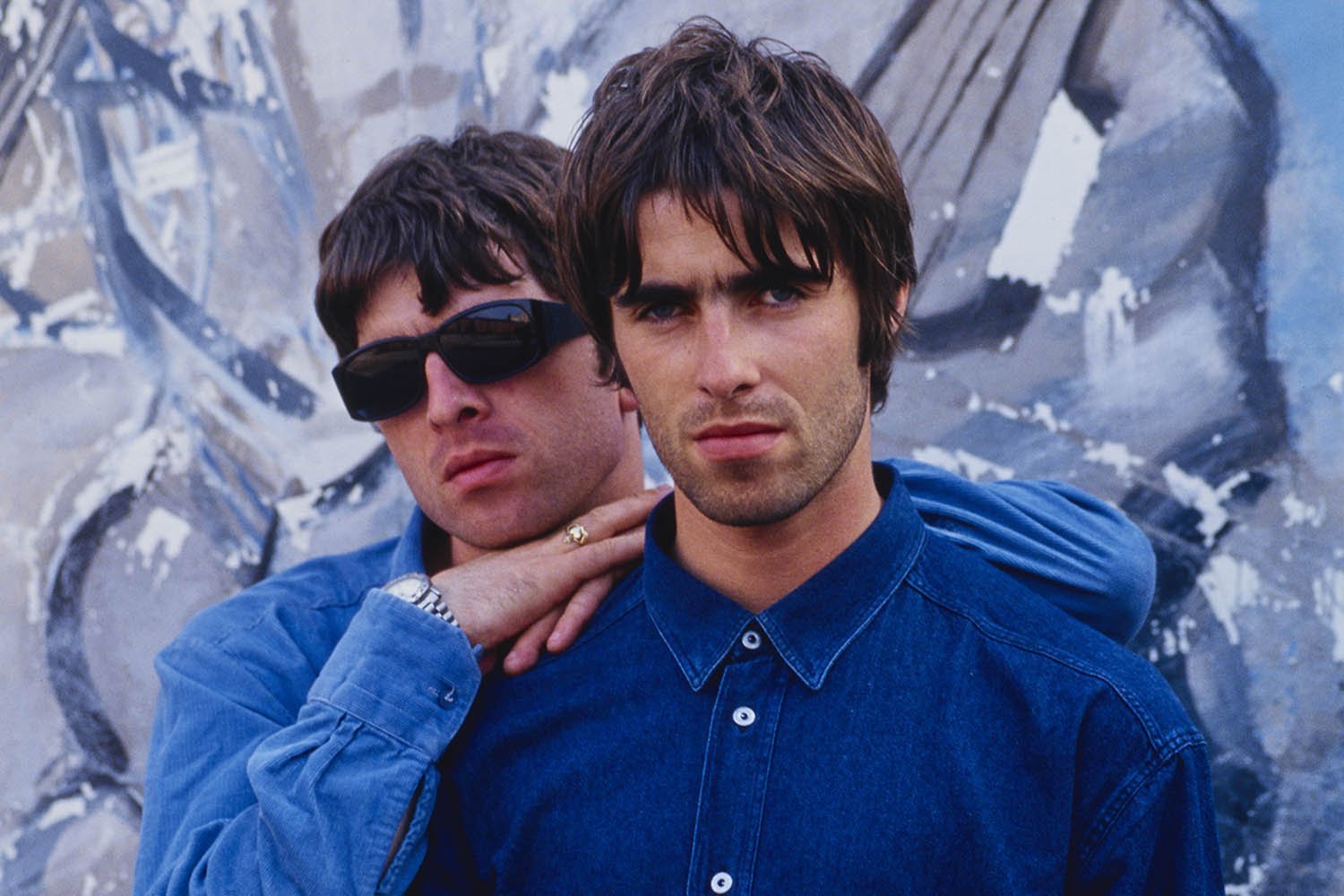
In 1993, by an accident of fate, I received a promotional tape from a record company publicist, Jim Merlis, who worked with Nirvana. He had made friends with a mad Scotsman named Alan McGee and sent a cassette with a bunch of Creation acts, calling out one in particular: Cigarettes & Alcohol. "Everyone is going crazy about this band," he said.
"What’s the big deal?" I thought when I heard it. "T Rex with different lyrics."
At that time, in the fall of 1993, I was a staff writer at the New Yorker. By the spring of 1994 I was a fired staff writer. Embarrassed at losing such a job, I fled to London. Oasis sounded different in England. I heard them on the radio, in record stores, everywhere. A lot of the excitement had to do with the singles. This aspect of Oasis feels lost now in the platform age; their early work has been repackaged on albums with titles like Stop the Clocks and Time Flies.
In some ways it was the B-sides that made the biggest impact: Fade Away and Listen Up; an early version of Columbia; and, especially, Acquiesce. To encounter Acquiesce on a B-side added an aura of limitless possibilities to the band. And it was this limitless horizon that the songs kept emphasising. "You and I are gonna live forever" is the most obvious example, but those early lyrics are overflowing with exhortations to live, an aspiration repeated so often it almost seemed in defiance of someone having once told Oasis to drop dead.
I saw Oasis live in London in 1994, and again, at Earl’s Court, in 1995. I remember an acquaintance walking beside me amid the throng of fans as we entered the arena in 1994. A seemingly mild-mannered guy, he turned to me with wild eyes and said the word that encapsulated the mood: "Butterflies!".
Twenty-two years later I would watch Supersonic, the documentary about their early ascent, in a half-empty theatre in New Orleans, and exit the theatre pondering where it had left us: arriving at Knebworth by helicopter. A massive crowd. A homecoming. The primal thump of the bass drum. And then ... Credits. The end. Or the end of the beginning.
I met the band just on the other side of this divide between moving upwards towards the sun and the other option, falling to Earth. It was the summer of 1997. I was on assignment for the music magazine Spin. The interviews were done at the Sony sound stage on 10th Avenue, New York, a big anonymous box of a building in Hell’s Kitchen.
I was put in a big room and my subjects were brought to me in batches. First came Alan White, Paul "Guigsy" McGuigan (or "Guigs", as the band called him), and Paul "Bonehead" Arthurs. Then came Noel Gallagher. And finally his brother, Liam, who was accompanied by a bodyguard, named Danny, in a tracksuit. I assumed Danny was there to protect Liam. But then I misspoke and said, "I quite liked your record", and Liam was on his feet. "You liked it quite a bit? What do you mean you liked it quite a bit? See ya later, man." He marched over to the door before Danny could get off the couch. Then Liam turned back towards me, and Danny’s other purpose was revealed: protecting people from Liam. "You’ve got big f****** hands, man," Liam said. "But I’ll knee you in the balls, man! Whaddya mean you liked it quite a bit? It’s tops, man. Tops!"
In the end, we worked it out. By the end of our chat he invited me to join them that evening at a bar he called "the Irish pub".

That night I arrived at the street corner with my girlfriend and was confronted with a large sign that read "The Irish Pub". It was my first clue that Liam is not as incoherent as he sometimes seems.
What transpired at the bar that night still seems incredible to me. ("I can’t tell you the way I feel / because the way I feel is, oh, so new to me," as the lyric to Columbia goes. The refrain is: "This is confusion, am I amusing you?".)
The most basic fact of the night is now a banal commonplace regarding the early years: the epic amounts of alcohol consumed by everyone, most notably Liam. Then there was the band’s choice of music on the jukebox. The band the members of Oasis, or really Liam, played over and over was called, "Oasis". Liam took great pleasure in singing along to the lyrics of his favourite band, sometimes slapping his open hand very hard into the chest of Danny in the tracksuit, while insisting he sing along.
A good friend with an interest in rock music, the writer Robert Bingham, had been bothering me all that day to bring him along to this rendezvous. His choice of companion at The Irish Pub was the most conservative, Waspy person he knew, a lovely guy named Willie who sat with Rob and me at a small round table while me and my girlfriend Jennifer chatted with McGuigan over pints of beer. McGuigan was a source of curiosity for me because of the way that both Noel and Liam, independent of one another, had mentioned Guigs as having had "a crispy".
I had never got a clear answer on the meaning of "a crispy". As far as I could tell it meant some sort of Gallagher-/tour-induced nervous breakdown. Guigs was already exploring other interests and, along with Bonehead, would soon bow out of the band. He seemed to be the most calm and non-violent of the group, even more than Alan the drummer, who was brought in late and seemed to want to make zero waves. And yet when Willie answered Guigs’ innocent question, "What do you do?" with the reply, "I’m a lawyer", the glass of beer came down on to the table at the same time that Guigs got to his feet. An electric current shot through the room. Guigs had sent up a flare.
By that point in the night, Guigs had told me, in a calm, slightly solemn way, about various brawls the band had been in, including a situation in Tokyo where they scrapped with American Navy ensigns. "There were about 35 of us," Guigs explained. "We were in a bar. One of them f***** with one us, but they didn’t know how many we were. And then we all stood up at once."
And what happened?
"We kicked the shit out of ’em," he said.
Once again, there was a "we all stood up at once" energy in the room.
Somehow, Willie murmured a sufficiently placating response. Everyone sat back down. Willie, in his pinstripe suit and impeccably knotted tie, remained, to his credit, unmoved by the whole thing.

"Marry her," he said. "Before someone else does."
Jennifer was as psyched to be hanging out with Oasis as anyone else would be, and Liam liked her. Let it be said! That such an agent of chaos should also have such a conservative streak — "marry her!" — is one of the paradoxes that fuels the story of Oasis, which is also a story of two talents that hover in the tension of killing one another and complementing one another. Cain and Abel never had a band, after all, and never had to do press.
After the New York interviews, I followed them out to California that summer of 1997, where they set up shop in a stadium in Oakland opening for U2. Be Here Now was chugging its way to record stores across the land. This was the moment in the cartoons when someone runs off a cliff and for a while they are suspended in the air, legs churning, but not dropping, yet.
After their set, there was a memorable scene with Noel in a sky box — literally a glass box way up in the sky. We had a nice chat fuelled by my offer of a powder. (I am still annoyed that Spin magazine did not reimburse me for this, as I had quite reasonably listed it among my expenses alongside meals and transportation, which, come to think of it, are both words one could use to describe the substance.)
"Don’t mind if I do," Noel said, and when he lowered his head to imbibe I saw, in the next glass box over, Liam Gallagher himself, both arms thrown out around the empty seats on either side of him, one leg crossed on the other knee, sitting resplendent in kingly solitude in dark shades, watching the "fookin egg" which was U2’s stage set on that tour. It was like a movie, or an allegory: Noel’s face fills the screen, then, when he moves out of the frame, Liam. It was a perfect moment of regeneration. One brother morphing into the other, different but the same.
Later that night I trailed Liam into a backstage party where I was not meant to be, and from which I was ejected by an angry San Francisco security guard. But not before I absorbed the sight of Liam singing his own songs into Bono’s face. Singing at the top of his lungs while slapping the U2 singer’s chest with his open hand and insisting he sing along.
Bono was recently quoted, in advance of this summer’s Oasis shows, as saying: "I love them; I just love them. And what I really love is, the preciousness that had got [into] indie music, they just blew it out. There was just the swagger, and the sound of getting out of the ghetto, not glamorising it ... they were rawer than anybody."
My encounter with the band was about a year after Knebworth, prior to the release of Be Here Now. It was the beginning of the long second act. And then the break-up years involving the brothers hiding in plain sight. It’s not like they stopped making records and touring.
If there is a chart for the most mentions in the NME over the past 30 years, Oasis and the Gallagher brothers combined must surely be at number one. But the sense during this period was never of finality, but rather of dormancy. A volcano, not a death. And now these two wizened faces peering out at us from a poster, skirting perilously close to Spinal Tap territory and yet not, because the excitement is real.
Once again: "Butterflies". — The Observer












